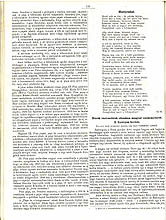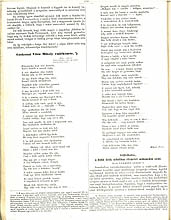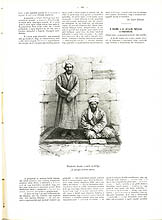In March 1857, when Vámbéry left his country for the
first time, he also opened a new chapter in his life, as the period of private tutorship, practised since his student age, came to an end – at least in his
homeland. The idea of traveling to the East was matured by him under the influence of
his readings, and his modest savings gave him hope to a change. His journey to
Constantinople, which has become a reality thanks to the support of his patrons,
primarily of József Eötvös, who recognized his talent, 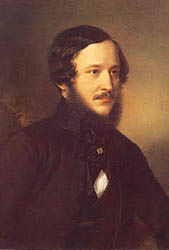 1
offered an outbreak from his situation. The unparalleled amount of knowledge,
absorbed from the books he read in a dozen of languages, provided with a
considerable theoretical framework the young man driven by curiosity, who
now had the opportunity to study a foreign culture in its real context. The
Turkish language, which he could not practise at home, now surrounded him as a
living language.
1
offered an outbreak from his situation. The unparalleled amount of knowledge,
absorbed from the books he read in a dozen of languages, provided with a
considerable theoretical framework the young man driven by curiosity, who
now had the opportunity to study a foreign culture in its real context. The
Turkish language, which he could not practise at home, now surrounded him as a
living language.
 Vámbéry
set out by ship along the Danube, and arrived through the port city of Galați
and the Black Sea in the Ottoman capital. His talent of languages attracted the
attention of his fellow travelers already on the way: on one occasion he won the
confidence of a Muslim traveler by reading aloud a portion of the religious
handbook Kirk Sual (Forty Questions).
Vámbéry
set out by ship along the Danube, and arrived through the port city of Galați
and the Black Sea in the Ottoman capital. His talent of languages attracted the
attention of his fellow travelers already on the way: on one occasion he won the
confidence of a Muslim traveler by reading aloud a portion of the religious
handbook Kirk Sual (Forty Questions). 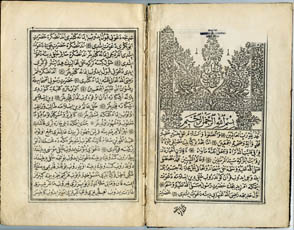 However,
the unpredictability and uncertainty of day-to-day existence followed him since
the moment he landed in the Galata neighborhood of Istanbul. As he wrote in his
memoirs: “I had no idea where I would stay and, completely penniless, how
I would
make my living in this strange city.”
2
However,
the unpredictability and uncertainty of day-to-day existence followed him since
the moment he landed in the Galata neighborhood of Istanbul. As he wrote in his
memoirs: “I had no idea where I would stay and, completely penniless, how
I would
make my living in this strange city.”
2
He owed a lot to the Hungarian emigrants, who were informed about his journey
from the Hungarian newspapers. Among the several Hungarians in Istanbul, he
first met a certain “Mr. Püspöky”
3 immediately after his landing in the city, who also helped to
resolve his problem of accommodation. Vámbéry also mentions the names of
several Hungarian emigrants as his supporters, including István
Türr (1825-1908), Sándor Veress, Balázs Orbán (1829-1890) and Lajos Splényi (1817-1860).
4 His most important Hungarian connection was probably his friendship with Dániel Szilágyi. In the years after the Crimean war, this former hussar officer,
who emigrated to Constantinople in 1849, operated an antiquarian bookshop,
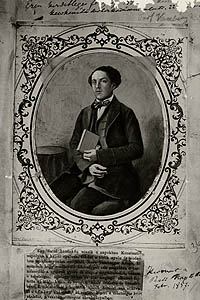 where he passionately collected Turkish books and manuscripts.
Although there is no clear evidence, it is assumed that Vámbéry seized a part
of his Oriental manuscripts through the mediation of Szilágyi. When this latter
died in 1885, Vámbéry called the attention of the Hungarian Academy to his
legacy of unparalleled value, and his manuscripts were purchased in 1886 with
Vámbéry’s cooperation.
where he passionately collected Turkish books and manuscripts.
Although there is no clear evidence, it is assumed that Vámbéry seized a part
of his Oriental manuscripts through the mediation of Szilágyi. When this latter
died in 1885, Vámbéry called the attention of the Hungarian Academy to his
legacy of unparalleled value, and his manuscripts were purchased in 1886 with
Vámbéry’s cooperation.
His relationships developed with the members of the Ottoman political elite were
even more important than his good relations with the Hungarians living in
Istanbul. His interest in everyday language and behavior, his quick
comprehension and literary erudition helped him to win the confidence of the
Turks, and to develop relationships leading to the highest circles of the
Ottoman political elite. In his memoirs he remembers like this: “The more I got
acquainted with this new moral system and the deeper I penetrated into the ways of
living and thinking of Oriental people,
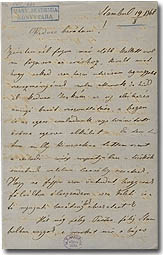 the larger the circle of my acquaintances became, and the easier the doors opened before me, not only in the houses of the simple officers, but also in
those of the high and highest dignitaries.”
the larger the circle of my acquaintances became, and the easier the doors opened before me, not only in the houses of the simple officers, but also in
those of the high and highest dignitaries.”
The possibility of rapid social success had a liberating effect on him, because
unlike in his country, “in Turkey the born aristocracy is unknown”.
5
As he wrote in a letter to József Budenz at the beginning of his second journey,
on 19 August 1861: “I did not know how great treasures I gained in the troop of
the real مؤمنين
6
: the Turks love me, really, intrinsically love me.”
7
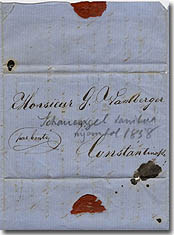
Vámbéry wanted to earn his living also in Turkey by his previously gained
science and kowledge of languages. Thanks to his ever extending system of
Turkish relationships,
and also to the support of the Hungarian émigré officer György Kmetty (in his
Turkish name, Ismail Pasha) he received a teacher’s position in the house of
Husein Daim Pasha. From the Pera neighborhood, which was mainly inhabited by
Europeans, he moved to the Turkish-populated Katabaş. There he was given the
name Reshid (“well-led, the one going on the right path), which he from then on
used in the Muslim world. The process of “becoming Turk” was a noticeably
exciting challenge for him, but his metamorphosis remained always an outward
one. He writes about it like this:
“The Turkish disguise put on myself, as well as my
pretended Oriental personality and knowledge were merely outward appearances,
because not only was my soul deeply permeated by the Western spirit, but the
deeper I penetrated into the life and way of thinking of the Asian society, the
more passionate my devotion to the West became, because it became clear to me,
that the human existence worthy of this name and all that is really noble and
sublime, can find its way only in the framework of the aspirations of the West.”
8
His ability to learn and his adaptability were acknowledged by the
fact that he was considered a muhtedi, a real convert who was led on the
path of the truth. However, he writes:
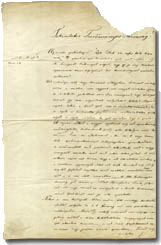 “the idea of conversion could not put roots in my mind,
because although I had been permeated for a long time by the ideals of the absolute
freethinkers, in the Islam I found a system of beliefs which, due to its solid
foundation and rational dogmas, was the more dangerous for the free flight of the
spirit, and due to my open hostility to every positive religion, was the more
damnable in my eyes.”
9
“the idea of conversion could not put roots in my mind,
because although I had been permeated for a long time by the ideals of the absolute
freethinkers, in the Islam I found a system of beliefs which, due to its solid
foundation and rational dogmas, was the more dangerous for the free flight of the
spirit, and due to my open hostility to every positive religion, was the more
damnable in my eyes.”
9
In 1859, two years after his arrival in Istanbul he taught history, geography
and French language in the house of the recently deceased renowned statesman and
former foreign minister Sadik Rifat Pasha
(1801-1857), to his son Rauf. There he was absorbed in Turkish social life: as a
guest of social gatherings and receptions, he had the opportunity to develop
relationships with the members of Turkish literary societies and political
elite. He became a frequent guest in the upper echelons of the political elite,
where he got in contact with the most influential personalities of the Ottoman
reform era (Tanzimat), Fuad Kechijizade Pasha (1814-1868), Mehmed Emin Ali Pasha (1815-1871),
Mustafa Reshid Pasha,
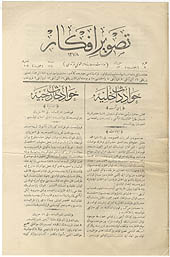 as well as with the later intellectual father of the Turkish constitution,
Midhat Pasha (1822-1884). He also mentions his relations with some important
statesmen, Rushdi Mehmed Pasha(1811-1882) or Kibrisli Mehmed Emin Pasha (1813-1871),
and he also gave lessons in the house of Mahmud Nedim Pasha
(1818-1883), a representative of the pro-Russian political aspirations. He could also
meet the great intellectual figures of the Turkish reforms, including the
renowned author Ibrahim Shinasi
(1826-1871), the founder of the Istanbul journal Tasvir-i Efkar (1862).
On the recommendation of Kibrisli Mehmed Pasha, on one occasion he was also the
interpreter of Sultan Abdulmedjid (1839-1861).
as well as with the later intellectual father of the Turkish constitution,
Midhat Pasha (1822-1884). He also mentions his relations with some important
statesmen, Rushdi Mehmed Pasha(1811-1882) or Kibrisli Mehmed Emin Pasha (1813-1871),
and he also gave lessons in the house of Mahmud Nedim Pasha
(1818-1883), a representative of the pro-Russian political aspirations. He could also
meet the great intellectual figures of the Turkish reforms, including the
renowned author Ibrahim Shinasi
(1826-1871), the founder of the Istanbul journal Tasvir-i Efkar (1862).
On the recommendation of Kibrisli Mehmed Pasha, on one occasion he was also the
interpreter of Sultan Abdulmedjid (1839-1861).
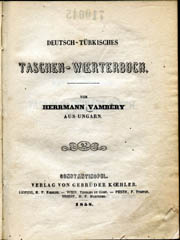 His
Istanbul period was also an important milestone of his scholarly career. He
visited libraries, where he focused on the Turkish historical works, and
especially on their parts referring to Hungary. At that time he published his
first work of his own, a German-Turkish pocket dictionary. His literary
ambitions are illustrated by his more than twenty essays published until 1861 in
Hungarian journals and magazines. Among others, he published the translations of
the Hungarian-related chapters from the historical works of Ibrahim Pechevi (1572-1650)
and Hodja Mehmed Sadeddin (1536/37-1599) in the Vasárnapi Ujság, the Új
Magyar Múzeum, and the Hazánk. He also translated some parts from Ahmed Feridun’s (died 1583)
collection of historical documents, published in print in 1858, for the Magyar Történelmi Tár,
and later for Az Ország
Tükre. He also wrote a large number of linguistic articles, reports and
popularizing essays, mainly for the Vasárnapi Ujság and the Pesti Napló.
An important scientific event of his Istanbul period was, that in 1860 he
discovered the only known copy of the 16th-century Turkish-language Hungarian
chronicle Tarih-i Üngürüs, which he donated to the Academy.
His
Istanbul period was also an important milestone of his scholarly career. He
visited libraries, where he focused on the Turkish historical works, and
especially on their parts referring to Hungary. At that time he published his
first work of his own, a German-Turkish pocket dictionary. His literary
ambitions are illustrated by his more than twenty essays published until 1861 in
Hungarian journals and magazines. Among others, he published the translations of
the Hungarian-related chapters from the historical works of Ibrahim Pechevi (1572-1650)
and Hodja Mehmed Sadeddin (1536/37-1599) in the Vasárnapi Ujság, the Új
Magyar Múzeum, and the Hazánk. He also translated some parts from Ahmed Feridun’s (died 1583)
collection of historical documents, published in print in 1858, for the Magyar Történelmi Tár,
and later for Az Ország
Tükre. He also wrote a large number of linguistic articles, reports and
popularizing essays, mainly for the Vasárnapi Ujság and the Pesti Napló.
An important scientific event of his Istanbul period was, that in 1860 he
discovered the only known copy of the 16th-century Turkish-language Hungarian
chronicle Tarih-i Üngürüs, which he donated to the Academy.
His further career was determined by his Istanbul experiences, especially by his
interest in the Eastern Turkic languages and in the works necessary to study
them. In this period he had the occasion to read some Eastern Turkic works in
the library of Ali Pasha.
Through his acquaintances he had a better overview of the Turkish political
processes of outstanding importance for the European public opinion, and thus he
became an appreciated occasional Istanbul correspondent for various journals,
such as the Augsburger Allgemeine Zeitung or the Viennese Wanderer.
His reports published in the Hungarian journals are also good evidences for his
unfolding publicist’s and journalist’s activity.
His Istanbul study years created for him the opportunity to step further. He
felt that his translator’s and interpreter’s work earned him not only a good
living, but also enough fame and honor to continue his career
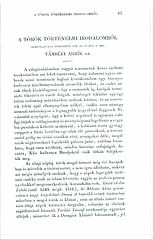 as a high-rank Ottoman officer. Nevertheless, he voluntarily resigned it, due to
his adventurous nature which always sought new challenges. The reasons why he
did not establish himself in Istanbul, were presented in his confessions: “…
I myself do not know why, but I was not attracted by a Turkish bureaucratic
career, and by the perspective of being the employee of a state which is only
barely tolerated in Europe.” At the same time “… I would have probably soon had
enough of even the greatest success in this field, first because my rampant
feeling of freedom would have not tolerated for long any kind of subordination,
and second because I was and have remained an incorrigible enthusiast and
dreamer, and I only found enjoyment in extraordinary things.”
10
as a high-rank Ottoman officer. Nevertheless, he voluntarily resigned it, due to
his adventurous nature which always sought new challenges. The reasons why he
did not establish himself in Istanbul, were presented in his confessions: “…
I myself do not know why, but I was not attracted by a Turkish bureaucratic
career, and by the perspective of being the employee of a state which is only
barely tolerated in Europe.” At the same time “… I would have probably soon had
enough of even the greatest success in this field, first because my rampant
feeling of freedom would have not tolerated for long any kind of subordination,
and second because I was and have remained an incorrigible enthusiast and
dreamer, and I only found enjoyment in extraordinary things.”
10
His work was rewarded with an important recognition in his homeland: in the
spring of 1861 Vámbéry was elected a corresponding member of the Academy. After
four years of absence he returned to Pest with the strong determination of an
Eastern study trip. He held his inaugural speech in April 1861 in the topic of
Ottoman chronicles, and then he turned to the President of the Academy, Count
Emil Dessewffy (1814-1866) for a support to his planed Central Asian journey.
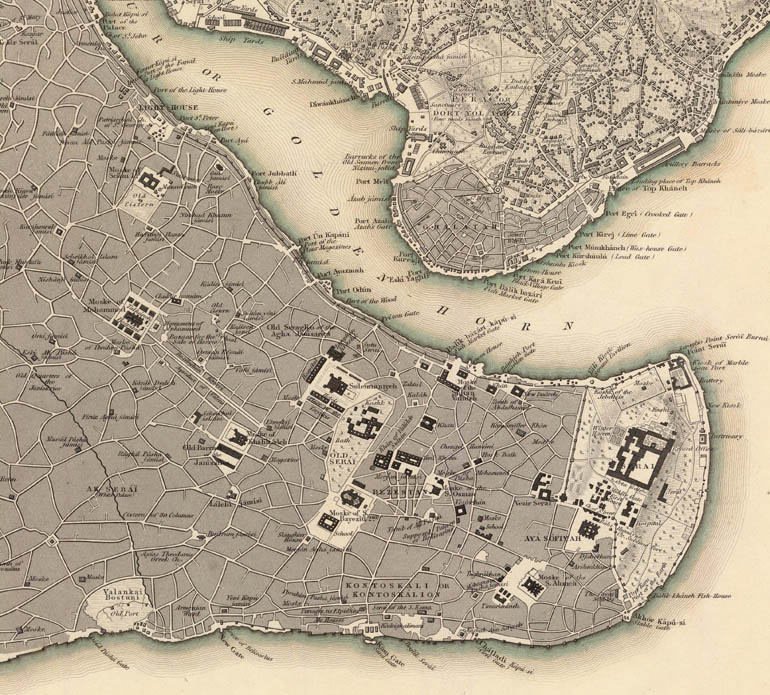
Constantinople – Stambool. Map
of J. R. Davies from
1860, the period of Ármin Vámbéry’s stay in the city (full
map here, 8 MB)
 1
offered an outbreak from his situation. The unparalleled amount of knowledge,
absorbed from the books he read in a dozen of languages, provided with a
considerable theoretical framework the young man driven by curiosity, who
now had the opportunity to study a foreign culture in its real context. The
Turkish language, which he could not practise at home, now surrounded him as a
living language.
1
offered an outbreak from his situation. The unparalleled amount of knowledge,
absorbed from the books he read in a dozen of languages, provided with a
considerable theoretical framework the young man driven by curiosity, who
now had the opportunity to study a foreign culture in its real context. The
Turkish language, which he could not practise at home, now surrounded him as a
living language. Vámbéry
set out by ship along the Danube, and arrived through the port city of Galați
and the Black Sea in the Ottoman capital. His talent of languages attracted the
attention of his fellow travelers already on the way: on one occasion he won the
confidence of a Muslim traveler by reading aloud a portion of the religious
handbook Kirk Sual (Forty Questions).
Vámbéry
set out by ship along the Danube, and arrived through the port city of Galați
and the Black Sea in the Ottoman capital. His talent of languages attracted the
attention of his fellow travelers already on the way: on one occasion he won the
confidence of a Muslim traveler by reading aloud a portion of the religious
handbook Kirk Sual (Forty Questions).  However,
the unpredictability and uncertainty of day-to-day existence followed him since
the moment he landed in the Galata neighborhood of Istanbul. As he wrote in his
memoirs: “I had no idea where I would stay and, completely penniless, how
I would
make my living in this strange city.”
2
However,
the unpredictability and uncertainty of day-to-day existence followed him since
the moment he landed in the Galata neighborhood of Istanbul. As he wrote in his
memoirs: “I had no idea where I would stay and, completely penniless, how
I would
make my living in this strange city.”
2
 where he passionately collected Turkish books and manuscripts.
Although there is no clear evidence, it is assumed that Vámbéry seized a part
of his Oriental manuscripts through the mediation of Szilágyi. When this latter
died in 1885, Vámbéry called the attention of the Hungarian Academy to his
legacy of unparalleled value, and his manuscripts were purchased in 1886 with
Vámbéry’s cooperation.
where he passionately collected Turkish books and manuscripts.
Although there is no clear evidence, it is assumed that Vámbéry seized a part
of his Oriental manuscripts through the mediation of Szilágyi. When this latter
died in 1885, Vámbéry called the attention of the Hungarian Academy to his
legacy of unparalleled value, and his manuscripts were purchased in 1886 with
Vámbéry’s cooperation. the larger the circle of my acquaintances became, and the easier the doors opened before me, not only in the houses of the simple officers, but also in
those of the high and highest dignitaries.”
the larger the circle of my acquaintances became, and the easier the doors opened before me, not only in the houses of the simple officers, but also in
those of the high and highest dignitaries.”




